‘They are trying to keep the refuges out of Denmark in a really bad way; I would describe it as inhumane’
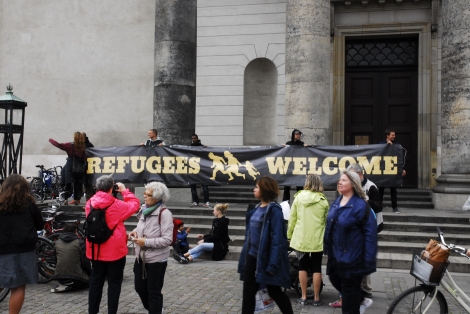
Image from demonstration in September 2015 in Copenhagen via Tumblr, Klaus Berdiin Jensen
That is Haussen, a Syrian refugee now living and working in Aarhus, Denmark who calls the changes to Danish law ‘unacceptable’.
These recent policies have been controversial to say the least and now The Danish People’s Party (DPP) has brought forward the idea of offshore processing, inspired by Australia’s current refugee policy which has been in effect since 2012.
Individuals seeking a safer place to call home should no longer look to Denmark for refuge; the DPP are attempting to introduce the offshore processing of refugees and asylum seekers to countries such as Greenland in an effort to deter refugees from travelling to Denmark at all.
Meanwhile in Australia, protesters are tirelessly campaigning across the country to ‘Let Them Stay’, a movement working against the government’s removal of 267 people including 91 babies and children to Nauru, a small country northeast of Australia. These refugees were brought to Australia from Nauru for their own or a family member’s medical treatment but are now being told they will be removed from the country and forced back to subpar detention facilities.
Sydney Mayor Clover Moore said during a rally in her district, ‘both the Federal Government and the Opposition have failed us over many years. They are lily-livered and gutless, more concerned about votes than human lives’.
However Former Prime Minister Tony Abbott reiterated in London in 2015 that Australia’s refugee policy was successful stating that Europe could learn from their example,
‘People smuggling is a global problem, and Australia is the only country that has defeated it, twice under conservative governments, our experience should be studied.’
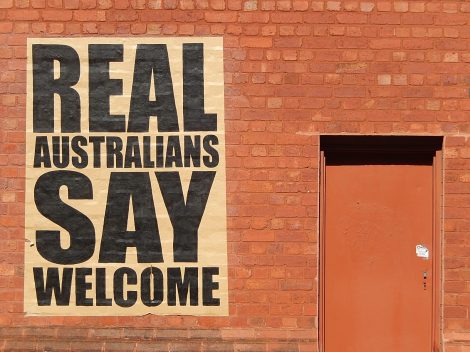
Image via Flickr, Michael Coghlan
The Australian model works but at what cost:
Since 1991 Australia has been using offshore processing for refugees and asylum seekers. The current policy which began in 2012 follows that refugees are housed in Papua New Guinea (PNG), Christmas Island and Nauru to await processing.
Australia’s policy as it stands today has zero tolerance towards boats carrying asylum seekers or refugees. No asylum seekers or refugees are currently able to reach Australia by boat, authorities either send the boats for offshore processing or send them back to their country of origin – namely Indonesian where many of these boats originate.
Currently Australia operates under the program, Operation Sovereign Borders; which places the military in control of intercepting boats attempting to reach Australian borders.
Australia also reached a deal with Papua New Guinea which details that any asylum seekers judged to be genuine refugees would be resettled in PNG, not Australia.
An important distinction should be explained here, refuges and asylum seekers are defined differently, according to the United Nations High Commissionor for Refugees (UNHCR), ‘an asylum-seeker is someone who says he or she is a refugee, but whose claim has not yet been definitively evaluated’. A refugee is someone who experiences, ‘fear of being persecuted for reasons of race, religion, nationality, membership of a particular social group or political opinion’ and is unable to return to their home country.
Contrary to popular belief most of Australia’s refuges and asylum seekers actually arrive via air rather than by boat, however Australian policy continuously emphasises the need to ‘stop the boats’ from entering Australian waters and frequently intercepts boats in order to return them to their country of origin.
According to The Parliament of Australia website, estimates can vary but it is believed that around 96-99 percent of asylum seekers arrive via air and less than 1.5 percent arriving by boat.
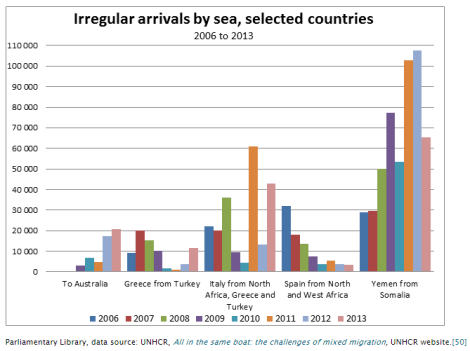
From the Parliament of Australia’s website – Asylum seekers and refugees: What are the facts?
Australia’s current policy is consistently met with extreme reactions on both sides, in 2013 The Liberal-National Coalition the party heavily campaigned to ‘stop the boats’ and went on to win the election.
Hundreds of reports have come to light in just a few short years about the mistreatment of residents in the Manus island detention centre in PNG and at Nauru, poor hygiene, increasingly cramped conditions and severe lack of facilities have all been identified as serious issues in these centres. Furthermore Amnesty International, Human Rights Watch and the United Nations have deemed many of these facilities as unsatisfactory and in violation of basic human rights.
According to the Australian Government’s Department of Immigration and Border Protection report (see tables below), in December 2015 alone there were 1,792 people in immigration facilities, of these people 56.4 percent had been detained for 365 days or less. Still a staggering 23.2 percent of people were kept in detention facilities for more than 730 days.
The average number of days the individuals spend in December 2015 was 445 days. Since May 2015 the number of average days held has steadily increased.
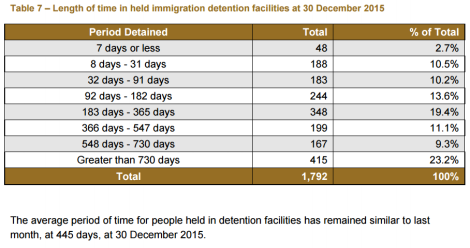

Indigenous Australian activist Ken Canning called the government’s plan to send refugees back to Nauru after spending a period of time in Australia, inhumane, during a Let Them Stay rally in Sydney. These rallies began in reaction to The High Court decision to uphold the legality of offshore processing in Australia.
Canning stated, that ‘It is an act of gross cowardice, these are the most defenseless people in the country and it is a gross act to send them back to Nauru. It is a gross act of humanity to keep anyone on Nauru’.
With these rallies comes a visual representation of the growing dissatisfaction towards the current liberal governments policies regarding offshore processing, a once incredibly favorable strategy.
Former Prime Minister of Australia, Tony Abbott, in a speech in October 2015 in London called the welcoming of refugees with open arms a ‘catastrophic error’ and urged Europe to adopt a more hard line approach similar to that of his own governments policy,
‘The Australian experience proves that the only way to dissuade people seeking to come from afar is not to let them in’.

Image from demonstration in September 2015 in Copenhagen via Tumblr, Klaus Berdiin Jensen
Europe’s policies:
In 2015 the right wing group, The Danish Peoples Party became Denmark’s second biggest political party with more than 21 percent of the vote. This reflects a growing trend across Europe where by politicians are increasingly influencing public votes by presenting refugees as a threat to a distinctly ‘European’ way of life,
‘Denmark has long led the continent in its shift to the right—and in its growing domestic consensus that large-scale Muslim immigration is incompatible with European social democracy’, said Journalist Hugh Eakin for The New York Review, 2016.
European spokesman for DPP, , stated that ‘we are trying to make Denmark [the] least attractive [place] in the western part of Europe’.
Amnesty International’s Europe director stated that the changes to Danish law were effetely exacerbating the hardships facing refugees entering the country, ‘to prolong the suffering of vulnerable people who have been ripped apart from their families by conflict or persecution is plain wrong.’
Berth stated that countries such as Greenland and Tanzania could be viable options for offshore processing, his position is that there is no more room for refugees either in Denmark or Europe as a whole,
‘If you don’t do anything, then I think the European culture will evaporate in a couple of years…we need to make it clear to these people that they cannot have a permanent life in a European country.’
Spokesman for the Danish Peoples’ Party stated that, ‘we hope this will start a chain reaction throughout Europe where other countries see the need to tighten their rules on immigration in order to keep the European culture.”
Across Europe various right wing groups have come to the forefront against the welcoming of refugees to their countries. In Poland, Jarosław Kaczyński member of the right wing Law and Justice Party and incredibly influential figure in polish politics, stated that refugees have the potential to bring ‘dangerous diseases’ into Europe.
Poland, along with Hungary, Slovakia and the Czech Republic, form Visegrad group, who in February announced they would present a united front in their attempts to shut the Balkan route, the main route used by refugees to enter European land. The four piece also called for an alternative plan to stop refugees at Greece’s borders with Macedonia and Bulgaria.
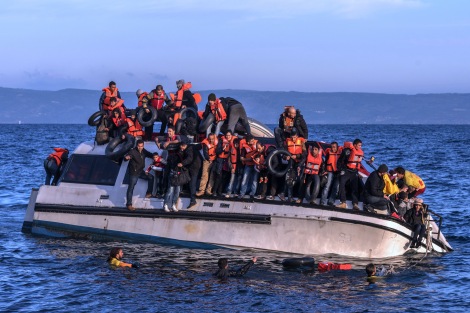
Syrian and Iraqi refugees arriving at Skala Sykamis Levos, Greece image via Wiki Commons
According to the United Nations the number of people arriving to Greece by boat has dramatically increased in 2015 where 850,000 refugees entered the country compared to just 43,500 in 2014. Historically Greece has served as a starting point for refugees who would pass through on their way to other, mainly northern, European countries.
However as many of these northern European countries are now turning people away, refugees have little choice but to stay in Greece.
Nevertheless EU member states have issued an ultimatum to Greece in reaction to their inability to enforce border controls; either they tighten up controls or face exclusion from the Schengen zone.
Reports have surfaced that Sweden, who initially welcomed 160,000 refugees in 2015, could now be rejecting the applications of half those currently in Sweden, potentially removing 80,000 people from the country.
Recent developments from Germany suggests that officials may soon begin to turn refugees away at their borders if the number of individuals seeking asylum in Germany doesn’t drop. Canceller Angela Merkel’s ‘open door policy’ currently still stands but is becoming increasingly unpopular with German citizens, 38 percent believe in sticking to the annual figure of 200,000 refugees.
Merkel previously relied on the support of Austria, who up until now have appeared to support her, however in a drastic stance, Austrian Social Democratic Chancellor Werner Faymann has announced that Austrian authorities will only accept eighty asylum applications per day.
In February before a crucial EU summit, Austria withdrew efforts to be a part of finding a common European solution. Vienna then teamed up with a number of eastern EU and Balkan countries to help Macedonia close its border with Greece.
Foreign Minister Sebastian Kurz from the Austrian People’s Party ,vocalized his disapproval of the current policy both in Austria and across Europe,
‘I want us to clearly tell Europe, especially Germany, ‘The invitation policy must come to an end.’’
As it currently stands the DDP does not have enough backing to put forward a realistic proposal for offshore processing. However as Denmark, who received around 20,000 refuges, a much smaller figure than other European countries such as Sweden or Germany who reported around 163,000 and more than one million refugees respectively in 2015 alone.

Turkish Refugee camp on the Syrian-Turkish border, Killis
Are there any solutions out there?
On the 7th of March EU leaders are gathering in Brussels for a summit on how best to proceed with the influx of refugees across Europe. The summit will address a possible deal with Turkey, which would aim at reducing the number of refugees entering greater Europe through Turkey.
Turkey is in a unique position, as a developing country it houses over 2.5 million Syrians alone. There are many positive things happening in Turkey with regards to refugee’s assistance and acceptance.
Programs aimed at helping refugees such as free education and health care placed considerable strain on Turkey’s national economy and social wellbeing. Currently the unemployment rate is at 10.5 percent, free health care is subject to unstable conditions and lack of operational space as well as personnel. Ghettoization is beginning to emerge leading to social friction between some groups of Turks and refugees. The time has come where Turkey needs extra support from the EU which it may well receive.
The EU has asked Turkey not to let refugees who initially arrive there to pass through to other European countries. The EU also have asked Turkey take back some of the individuals who moved on to Greece who are inevitably struggling with the sheer number of refugees in the country.
Nevertheless the summit will not provide a catch all immediate solution, it will be an ongoing process to put into effect the concept of ‘discouraging, stopping and, where necessary, redistributing refugees’.
Turkey is now in a position to bargain for an agreement from the EU, money, visa exemption, EU membership, and pass for human rights abuses.
The deal comes just after a tragic accident that claimed twenty five lives as a boat carrying refugees from Turkey to Greece sunk in the Aegean Sea, at least three children are said to be casualties from the incident.
Turkey has been accused of using its unique position with refugees and the EU for its own political gain. This comes at a time when Turkey is increasingly isolated regionally and internationally due to numerous foreign policy mistakes.
If it is in fact imperative for the EU to limit the number of refugees entering their countries then they must make a deal with Turkey. However Turkey, as many have pointed out, may not in fact be the best solution due to their politics and human rights violations.
Judith Sunderland, from Human Rights Watch said of the possible deal, ‘It is naked self-interest and wishful thinking to say Turkey is a safe country of asylum – it is not, and this deal could cause much more harm than good.’
As it currently stands a deal with Turkey may only be a temporary solution with more than 80,000 refugees arriving in Europe by boat in the first six weeks of 201. An extra three million expected by 2017 with a rate that shows no sign of slowing. If Turkey is not a permanent solution, will the DPP get its support for offshore processing? Only time will tell.
